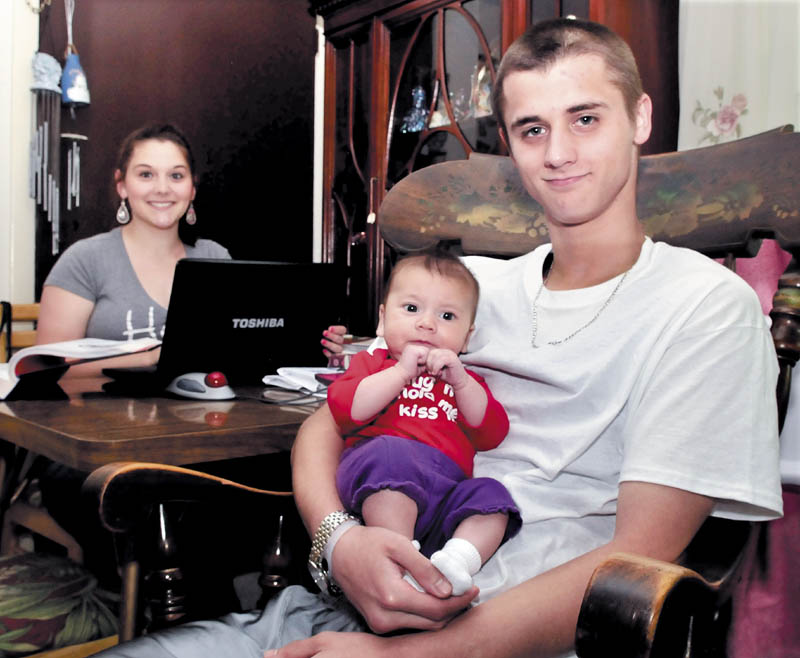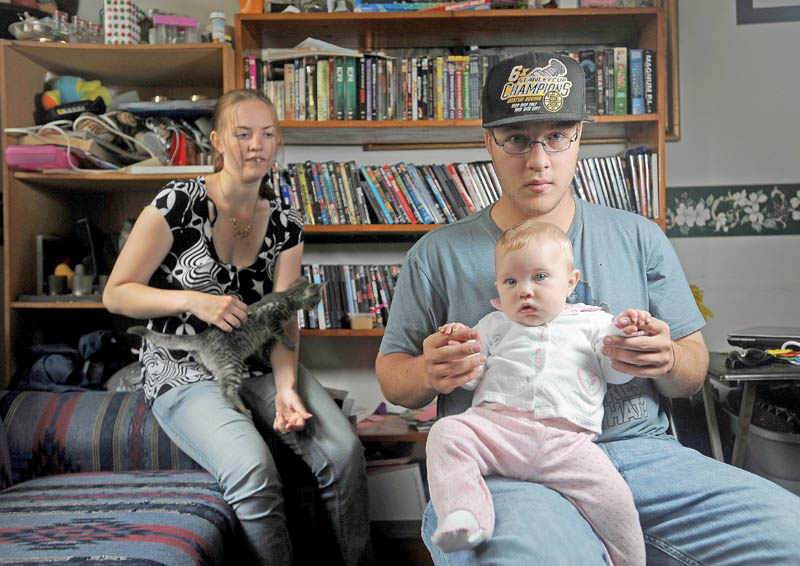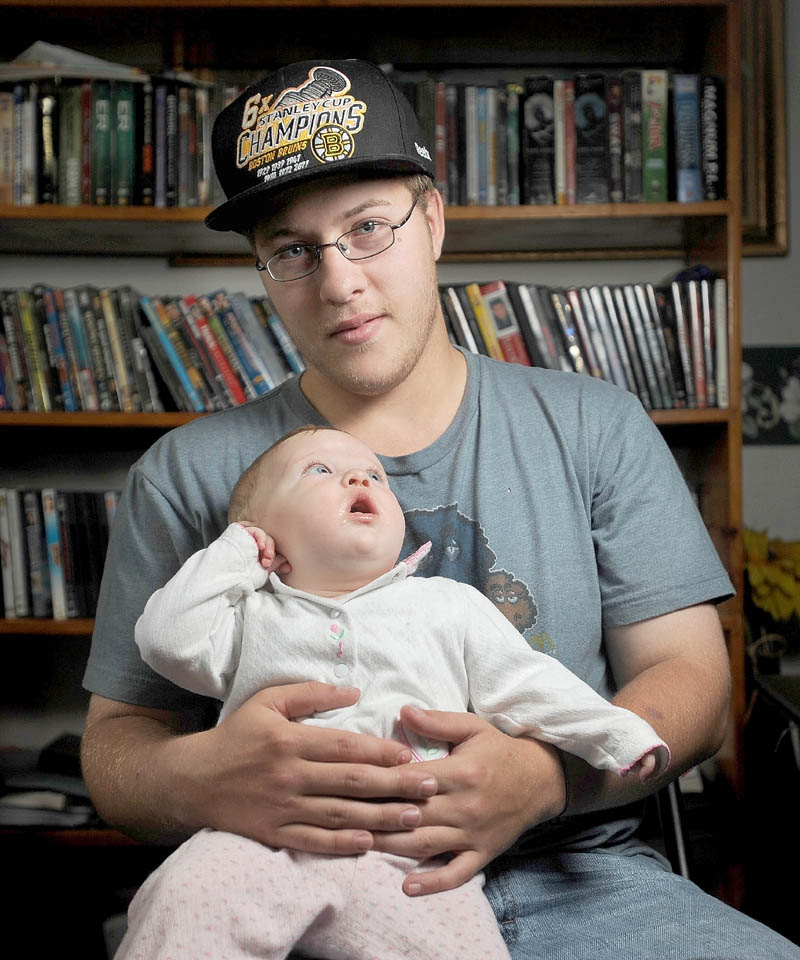A year ago, Chris Bilodeau, of Waterville, was just another tall, thin high school student with baggy shorts, a T-shirt and no job.
Bilodeau, then 17, split his time among an alternative schooling program offered at the Maine Children’s Home for Little Wanderers, his 16-year-old girlfriend, Melinda Pooler, and video games.
“I would sit in my house, turn the lights off, put a blanket on the window and play video games and stay up all night,” he said.
Then Bilodeau’s life changed one day late last summer. He was playing a violent role-playing video game set in post-apocalyptic Nevada called “Fallout: New Vegas.” He remembers his exchange with Pooler when she entered the room.
“Oh, hi,” he said. “I wasn’t expecting you.”
“I’m pregnant,” she said.
He thought she might be playing a joke.
“Are you kidding?” he asked.
That’s when she started to cry.
Bilodeau set his video game controller down, a lot closer to adulthood than he had been when he picked it up.
Teen pregnancy rates are relatively low in Maine, but statistics show young fathers such as Bilodeau — about 1.7 percent of the total national male teen population — are facing a long, upward battle to provide for their children.
A variety of research studies in the past 20 years have suggested that teen fathers tend to have lower incomes, less education and larger families than those who have children later in life.
The number of teen parents in Maine is shrinking, according to Nancy Audet, communications director, Family Planning Association of Maine. In 2007, the most recent year on record, 43 of every 1,000 girls between 15 and 19 got pregnant, far below the national rate of 68 per 1,000, which itself has declined by about a third since the 1990s.
This month, weeks before Father’s Day, Bilodeau became one of the first male graduates of a program designed to help teen parents navigate the twin challenges of parenthood and adolescence.
Bilodeau and a classmate retain many of the signs of their youth, but they said they are willing to do whatever it takes to be successful fathers.
Teen Parent Program
One sign of Bilodeau’s efforts to be a good father is his graduation this month from a Teen Parent School program at the Maine Children’s Home for Little Wanderers in Waterville.
The parent school helped guide him from typical teen experiences such as gaming and sports to a world of pelvic floor exercises, prenatal vitamins and, of course, diapers.
Bilodeau and Kevin Hardy, 19, of Winslow, joined their female classmates to learn how to best tackle the challenges before them — day care services, a wailing infant in the middle of the night, and balancing a new baby with a new job.
Jana Burgoyne, a parenting instructor at the school, said the two have shouldered a responsibility that others often drop.
“Usually, to be honest, the teen dads just are not as involved,” she said.
About 40 children attend classes at the children’s home, which provides an alternative path to a high school diploma from Waterville Senior High School.
Angie Woodhead, director of the parent school, is a little bit of everything — social worker, mentor, cheerleader and friend — to the students, whom she often refers to as “honey.” Around her, they are as relaxed and casual as they might be around their own families.
She said the students need a different path to overcome barriers. For some, the barrier is being a new parent; while others struggle with unaddressed mental health issues, social problems at home or substance abuse.
Woodhead said Hardy and Bilodeau impressed her by becoming the first males to graduate from the parenting school in 39 years, which she said left some at the program “pretty darn surprised by these guys.”
In order to accommodate the new dads, Woodhead had to tinker with the schedule a bit. She expanded “Teen Mom Pampering Day,” usually consisting of hair and cosmetic makeovers, to include the male equivalent — some uninterrupted video game time.
Working and living
In Woodhead’s office, Hardy reclined with such a relaxed posture that at times it seemed as though he might sink through the bottom of his easy chair. He spoke from beneath the brim of his baseball cap with a faint smile and a tone of irony, as if he wanted to express feelings of love and tenderness but couldn’t quite shake the sarcastic teen attitude of his peers.
Before Hardy’s 19-year-old girlfriend, Wendy Joler, got pregnant with their now-5-month-old daughter, Zoey, he said his life was a lot like Bilodeau’s.
“I would play video games and sports all the time. I didn’t care,” he said. “I would jump off bridges, do stupid stuff.”
When Joler told Hardy she was pregnant, the news put a sudden financial strain on a teenager with no car and no job.
Within days, he was applying to the Hannaford grocery chain, Goodwill, Subway, J&S Oil and McDonald’s — anyone he thought might hire him.
Hardy now spends about an hour a day walking more than three miles to get from his Winslow apartment to his new employer — Walmart, in Waterville.
As a student by day and a cashier by night, Hardy made $7.90 an hour, or about $300 every two weeks, $60 of which he gave to his mother for rent in the apartment they share. Graduating freed him to work more hours, and he expects a scheduled raise to $8.30 an hour will allow him to gross about $14,300 per year, still significantly below the poverty rate of $17,600 for a family of three in Maine.
Hardy and Joler are helped by public assistance in the form of state-subsidized health care and federal food assistance programs. Their mothers also help by looking after Zoey sometimes.
Bilodeau’s financial situation is even worse.
The day after Pooler walked into his room and told him she was pregnant, the two tried to map out a plan for the future.
As a result of that conversation, like Hardy, he was driven to seek a low-paying job immediately, partly to demonstrate he could be a provider.
Today he works at McDonald’s, where, at $7.65 an hour, he said he can work enough hours to earn about $12,700 per year.
Bilodeau’s mother has moved out of the area, so he has moved in with Pooler’s parents, who are in a subsidized housing program. Like Hardy, he contributes to the rent.
Parental challenges
The underlying motivations that spark the interactions between Bilodeau and Hardy and their girlfriends will be familiar to older parents, but they sometimes express themselves in ways that are characteristic of youth.
A month ago, Pooler said, she stole Bilodeau’s video games and hid them to make him help around the house more.
He responded by buying a new game.
For a while, Pooler said, she was afraid he would leave her, driven away by the stress of uncertainty about their future. She’s gotten more secure as she’s watched Bilodeau grow into his role as father and provider.
On Thursday, she complained about getting up in the middle of the night to take care of their daughter, Abigale, an example of the companionable bickering that allows them to air their complaints without it turning into a brawl.
“He don’t have that problem, because he sleeps through her crying and stuff,” she said. “He doesn’t get up to feed her. I do it all.”
“That’s usually when I have to work in the morning,” he protested. “When I don’t have to get up in the morning, I stay up late with her.”
“Sometimes,” she said.
“Most of the time,” he said.
“No, you just started doing that,” she said. The matter was dropped.
When the teens get together in Woodhead’s office, they compare notes on bibs or products to relieve teething pain.
They trade horror stories, scoffing at parents who smoke, drink or do drugs in front of their children. Even worse are those parents who hit their children, which Hardy calls “just ridiculous.”
Bilodeau wants to be there for his daughter, he said, because he didn’t meet his own father until he was 14 years old.
Hardy, who also doesn’t have a good relationship with his own father, expressed similar feelings.
“We want to be better fathers to our daughters than our fathers were to us,” he said.
Removing obstacles
Pooler worries about Abigale’s future. Her worries are fueled, in part, by a statistic that lingers in her consciousness.
“I heard something on the radio that said that, like, 90 percent of teen parents and their children were going to be poor,” she said.
Hardy said the lack of stability makes teen parenting difficult.
“You’re beginning a job and you still live with your parents, and you don’t know what you’re going to do,” he said.
Bilodeau and Hardy are working on the statistics stacked against them, one at a time.
After becoming the first dads to graduate from the parent school, they are working to find a way out of poverty.
Bilodeau considered an electrical engineering course, but he decided against it based on the high buy-in price — thousands of dollars’ worth of equipment — without a guarantee of a job.
Pooler, who still has a year left in high school, would like to see him pursue a career as a teacher.
Hardy plans to become a certified nursing assistant this year. He said he has a job lined up at a nursing home where he can earn a living wage of $15 an hour by working the graveyard shift.
“I want to give Zoey the best life possible,” he said. “I don’t care about me. I just care about her.”
His description of the need for male health care professionals, like his effort to help his family, is a mixture of awkward indiscretion, humorous honesty and an acknowledgment that he is, himself, a work in progress.
“If some big ol’ lady falls down, not to be rude or nothing, but it’s easier for a couple of guys to pick her up than five or six girls to pick her up,” he said. “Not to be sexist.”
Hardy and Bilodeau would like to overcome another statistic, produced by an independent study that found only 1 in 5 teen dads wed the mother of their first child.
While neither has set a date, both couples said they do plan to marry, another step on their journey to adulthood.
Matt Hongoltz-Hetling — 861-9287
mhhetling@centralmaine.com
Send questions/comments to the editors.





Success. Please wait for the page to reload. If the page does not reload within 5 seconds, please refresh the page.
Enter your email and password to access comments.
Hi, to comment on stories you must . This profile is in addition to your subscription and website login.
Already have a commenting profile? .
Invalid username/password.
Please check your email to confirm and complete your registration.
Only subscribers are eligible to post comments. Please subscribe or login first for digital access. Here’s why.
Use the form below to reset your password. When you've submitted your account email, we will send an email with a reset code.